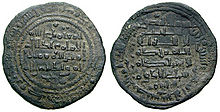- Al-Mu'tamid ibn Abbad
-
This article is about the Andalusi Arabic poet who was also the Abbadid king of Seville. For the Abbasid Caliph al-Mu'tamid, see Al-Mu'tamid.
Muhammad Ibn Abbad Al Mutamid (1040–1095) was the third and last ruler (reigned 1069–1091) of the taifa of Seville in Al-Andalus. He was a member of the Abbadid dynasty.
After the death of his father Abbad II al-Mu'tadid in 1069, he inherited Seville. In 1071, he attempted to seize neighboring Córdoba. He lost Córdoba in 1075 but regained it in 1078.
Al-Mu'tamid supported the Almoravid ruler Yusuf ibn Tashfin against king Alfonso VI of Castile in the Battle of Sagrajas in 1086. In 1091, however, his kingdom was overthrown by the Almoravids and he was deposed.
Al-Mu'tamid was bisexual. He was lover and patron to the Andalusi Arabic poet Ibn Ammar. His father disapproved of relations with a commoner and exiled the poet in order to separate them. On his succession, however, al-Mu'tamid granted Ibn Ammar political and military power. Their relationship was reportedly stormy, and came to an end when Al-Mu'tamid killed the poet with his own hands, only to bury him with great honors.[1] He is also considered, in his own right, one of the greatest of the Andalusi poets. Also the Sicilian Arabic poet Ibn Hamdis was guest and friend of his.
In 1091 Al-Mutamid was taken into captivity by the Almoravids and exiled to Aghmat, Morocco where he died in 1095. His grave is located in the outskirts of Aghmat.[2]
Al-Mu'tamid was the father-in-law, through his son, Fath al-Mamun (d. 1091), of Zaida, mistress, and possibly wife, of Alfonso VI of Castile.[citation needed]
See also
- Abbadid dynasty
References
Sources
- Souissi, Ridha (1977). Al Mutamid Ibn Abbad et son oeuvre poétique : étude des thèmes. Université de Tunis.
- Scheindlin, Raymond P. (1974). Form and structure in the poetry of Al-Mutamid Ibn Abbad. Leiden: Brill.
- Hagerty ed., Miguel José (1979). Poesia / Al-Mutamid. Barcelona: Antoni Bosch.
- Rubiera Mata ed., María Jesús (1982). Poesías / Al Mutamid Ibn Abbad. Madrid: Universidad de Sevilla.
External links
Preceded by
Abbad II al-Mu'tadidAbbadid dynasty
1069–1091Succeeded by
Deposed by Yusuf ibn Tashfin (Almoravid dynasty)Categories:- 1040 births
- 1095 deaths
- Abbadid
- Muslim poets
- Arabic-language poets
- Moorish writers
- Andalus poets
Wikimedia Foundation. 2010.

